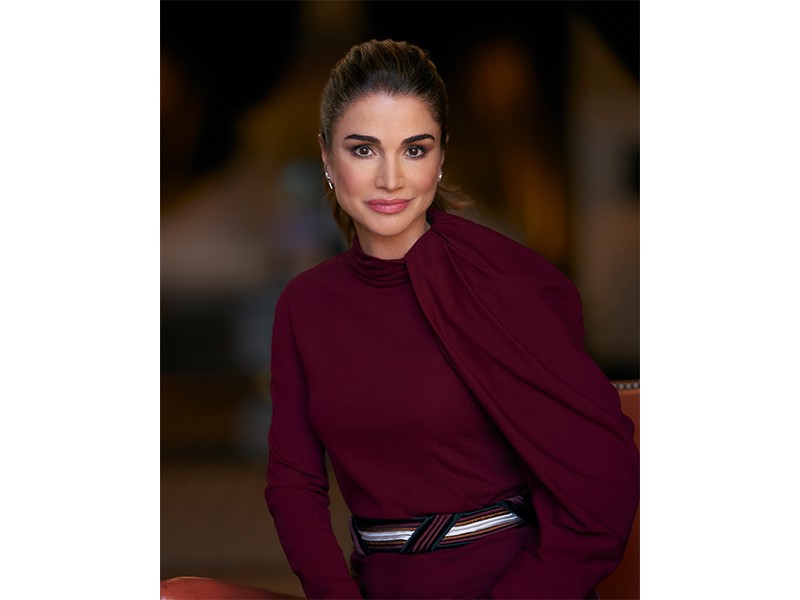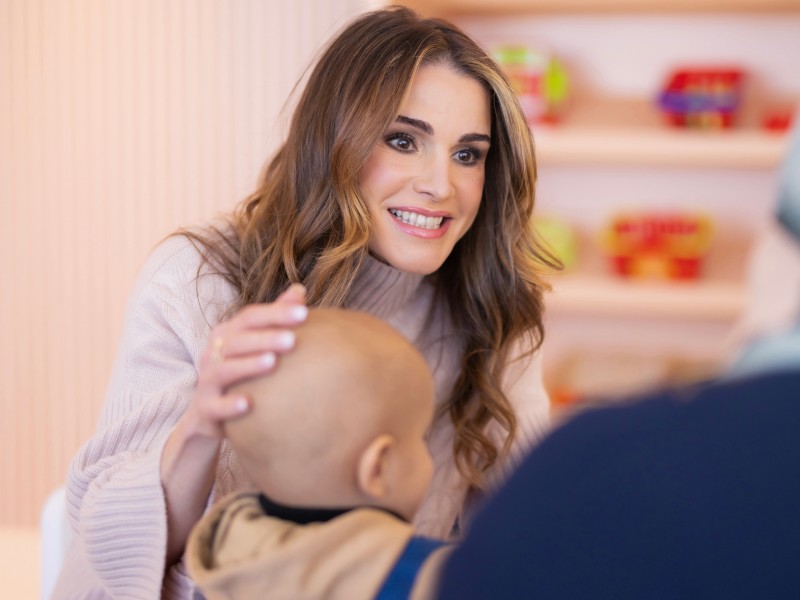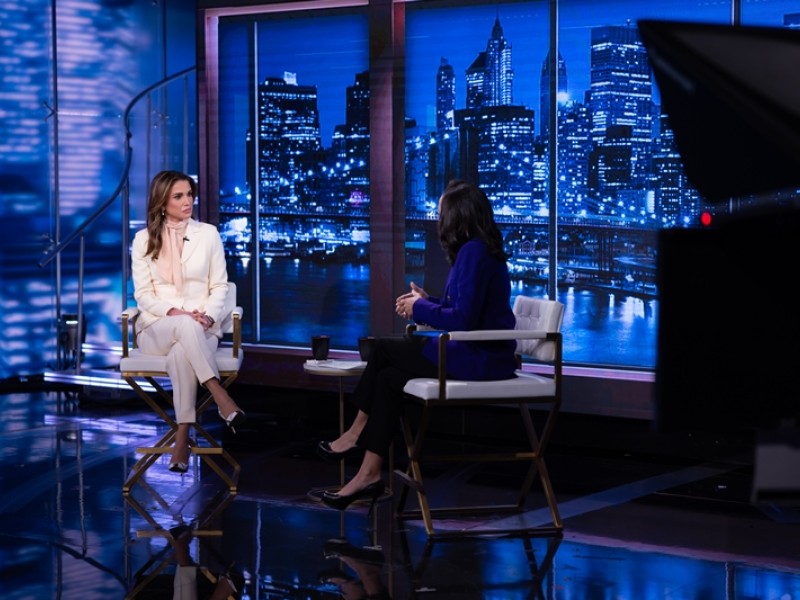In Interview with Impressions Magazine, Queen Rania Talks about What Motivates Her Work
What motivates you in your work?
Queen Rania: I am energized by the realisation that there is so much to be done. There is a chance to make a positive difference in the world. Nothing can be more challenging and, at the same time, more rewarding. My main goal is to pass along to the children and youth of this region a better situation than they face now. I want them to grow up with a sense of security and the knowledge that they have all the necessary tools to reach their full potential.
You are considered by many to be a role model for women. You have consistently stressed the importance of improving the political and economic status of Arab women. Why do you think this is so important?
Queen Rania: It is true that our part of the world has, in many ways, fallen short in terms of women's political empowerment and economic participation. In Jordan, women are beginning to participate more and more in all aspects of civic life. And throughout the region, things are changing for the better.
For example, I would like to mention and initiative launched by the Arab Women's Summit, a group consisting of First Ladies, representatives for non-governmental organizations and other female officials from many Arab nations. We have created a strategic alliance with Arab media executives and opinion leaders to change perceptions and stereotypes of women in the regional media. And it's working. Media and opinion makers are including more women in substantive, issue-oriented programming. Across the region, articulate women from a number of professional fields are being seen and heard engaging in spirited dialogue in primetime presentations.
I am proud that Jordan frequently serves as a model for such positive change in the region. However, change is happening not just in Jordan, but throughout the entire Arab world. Female education, for example, has improved faster in Arab countries than in any other region of the world. The literacy gap between men and women is nearly closed in many countries. In Jordan, we have achieved virtually full literacy for both genders. This is an achievement of which I think we Jordanians can rightfully be very, very proud.
Women in our region are making remarkable strides. National dialogues are underway to bring women into the political and economic mainstream. More and more, people are realizing that this is not just the right thing to do, but it will be the economically and professionally wise thing to do as well.
You were among the first to raise the issue of child abuse in Jordan and have been very much at the forefront of ways to prevent child abuse. Can you tell us about the progress Jordan has made in this area?
Queen Rania: I am glad you asked that question because child safety is something very close to my heart and I have been campaigning vigorously for many years to raise awareness about this issue. I am greatly encouraged by the positive response and proactive initiatives we have had since bringing this problem out in the open in Jordan.
When we originally addressed the matter of child abuse, there was initial resistance because people were ashamed to admit that such a problem existed in our society. But quickly, once the taboo was broken, people understood the need to act, and now they support the program fully. Whereas five or ten years ago, you would not have heard frank discussions about child abuse, now we, as a nation, are actively combating the problem.
Notable progress is being made. Fro example, this year on Human Rights Day, Jordan's Family Protection Unit was honored with a UN Prize for Human Rights for its achievements in combating child abuse. As a nation, we have committed ourselves to the prevention of, and intervention against, any form of child abuse – physical, psychological or sexual.
If we can keep our children out of harm's way, and at the same time keep families together by teaching new ways of interaction, then I feel like we have truly made a difference.
What would you show first-time visitors if you wanted to show them the best of Jordan?
Queen Rania: Oh, that is a difficult choice. I wish that everyone could visit Jordan. I really think that visitors would have the opportunity to see what I like to call the "real Middle East." They would not see a region full of the negative images that too often fill the television screens. Rather, they would see in Jordan a land rich in culture, with an open and tolerant society populated by peace-loving and hospitable this is the Arab and Islamic world which I know and cherish.
I suppose I could be accused of being slightly biased, because, of course, I want everyone to come and see all the special places in Jordan. Most people have heard of Petra, our famous UNESCO World Heritage site. It is truly one of the wonders of the world. But that's just the beginning. We are a small country, but have such variety. Visitors to Jordan can explore Roman ruins in the morning and be pampered at five-star health spans in the afternoon.
History buffs can visit deserted Crusader sites and sports enthusiasts can indulge themselves in the fabled waters of the Red Sea. And, importantly, Jordan is home to many oft the sites sacred to the three monotheistic religions of Judaism, Christianity and Islam. From spectacular scenery to famous nature reserves, from the silent desert to the bustling streets of Amman, Jordan truly has something for everyone.
I know that, unfortunately, many people are hesitant to travel in these difficult times. This is such a shame because people can learn so much by coming together and learning about each other. Travel builds tolerance, encourages friendship and can go such a long way to overcome fear and misunderstanding.
Can you tell us about your efforts to preserve and encourage Jordan's cultural heritage?
Queen Rania: Nurturing and preserving our cultural and artistic heritage is one of our most important national responsibilities. We have an obligation to protect our historical legacy and to leave our children their birthright of a strong and vibrant culture.
Our arts and culture, our crafts and colour; this is what makes ours, and every culture, unique and precious. This is what we must preserve for generations as yet unborn. In the same way, we want to preserve our natural resources and are proud of our highly successful ecotourism reserves, such as Wadi Dana and Wadi Mujib.
And, of course, in the short term, we are anxious to encourage tourism for practical reasons to preserving and protecting our pristine natural areas, creates jobs and opportunities, while at the same time introducing welcome guests to the beauties of our land. This is the kind of win-win economic development that I support wholeheartedly.
Your readers might be surprised to know about the potential for ecotourism in Jordan. We are working hard to save our natural environment. The Royal Society for the Conservation of Nature (RSCN) is active in the development of nature reserves and sustainable development projects, which encourage an enlightened approach to conservation. In the Ajloun area, for example, visitors can visit Roman ruins and a spectacular forested area, where may plant and animal species, once threatened with extinction, now flourish.
And that is just the beginning of our commitment to nature, because we have established over 1.000 nature conservations clubs for young people in schools throughout Jordan. We are looking toward the future, fostering an awareness and love of nature in our young people.
How do you see Jordan's role in the world? What message do you think Jordan has for the world?
Queen Rania: I believe that Jordan has a unique role to play in this troubled world. We have always enjoyed good relationships with a variety of nations with diverse viewpoints. This is part of our historical heritage and also is an example of the legacy of statesmanship left to us by the late king Hussein.
My husband and I are doing our best to continue that tradition and ensure that Jordan remains a bridge and conduit for encouraging international and inter-religious dialogue. Jordan has a long and proud tradition of promoting tolerance and coexistence between different cultures, religions and nations. We are also working hard to eliminate the kinds of conditions and misunderstandings that sometimes can lead to the growth of hatred or extremism.
There is no question; Jordan has its roots and its future in the Arab and Islamic World. These are our antecedents and this is our culture. Our traditions give us stability in a confusing world and our faith gives us models for behaving with respect and integrity. But this is not a limiting vision. On the contrary, this stability gives us the strength to reach out, with respect, to all other nations.
It is so important that we learn not to categorise or stereotype regions or nations. I believe that, more than ever, dialogue and mutual respect are the key elements in our shared global future. Deep down, we all share the same values. We all strive for a better life for ourselves and, especially, for our children. We all hope to see and end to war. I hope, in my own way, I can help to express that message and from the Arab and Islamic peoples to the world.
مواضيع مختارة
موقع جلالة الملكة رانيا العبدالله الرسمي
هذا الموقع الإلكتروني لا يدعم متصفحات الإنترنت القديمة. الرجاء تحديث متصفح الإنترنت إلى نسخة أحدث من إنترنت إكسبلورر 9
متصفح الإنترنت الذي تستخدمه قديم. لتحسين مستوى الأمان عند تصفح مواقع الإنترنت و مشاهدتها بالشكل الصحيح و بفعالية افضل قم بتحديث متصفح الإنترنت الخاص بك



